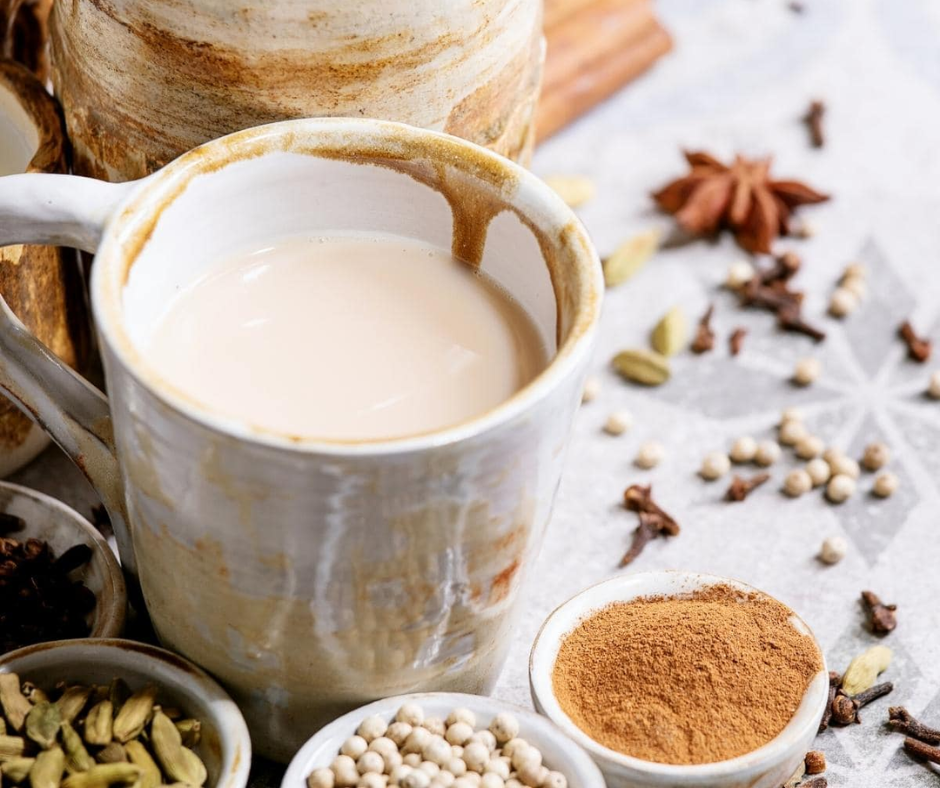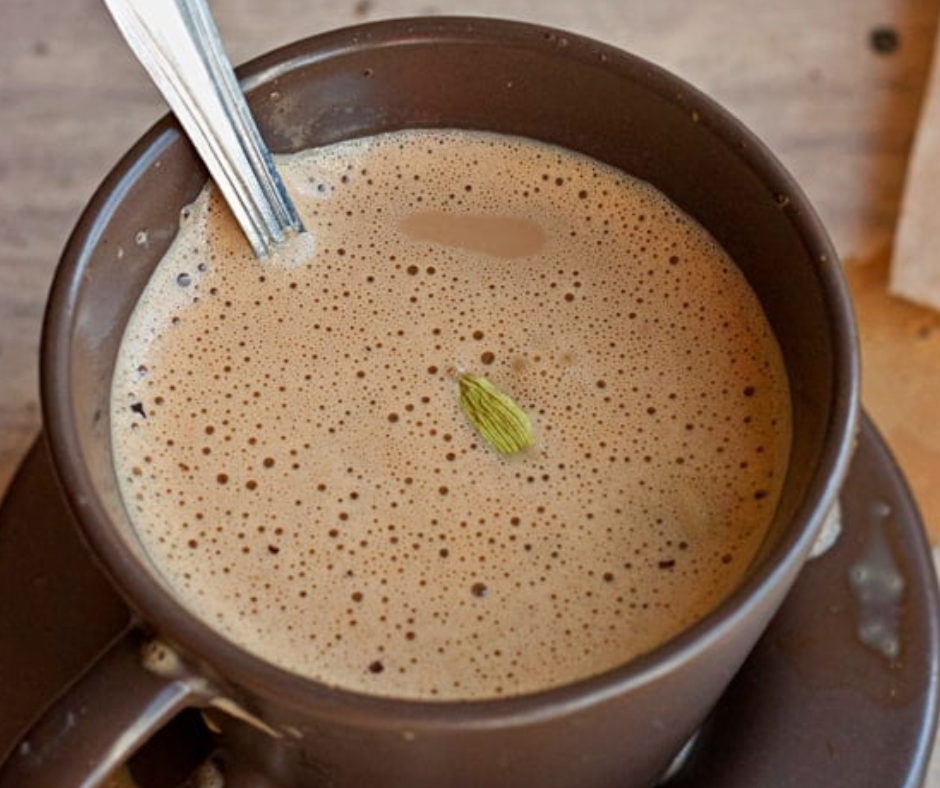Introduction
Chai tea has become increasingly popular in recent years, with its unique blend of spices and comforting flavor. But one question that often arises is: Does Chai Tea Have Caffeine? In this article, we will delve into the caffeine content of chai tea and explore the factors contributing to its kick.
What Is Chai Tea?
Chai tea, also known as masala chai, originated in India and has been enjoyed for centuries. It is made by combining black tea with a blend of spices such as cinnamon, cardamom, ginger, cloves, and black peppercorns. The result is a rich, aromatic beverage with a complex flavor profile.
While traditional chai tea is made with black tea, green or herbal tea variations have also gained popularity. These variations offer different flavor profiles and caffeine content, which is important to consider when exploring chai tea’s caffeine levels.
The Caffeine Quandary: Exploring Chai Tea’s Kick
The caffeine content in chai tea can vary depending on the type of tea used as a base. Traditional chai tea with black tea typically contains caffeine, as black tea naturally contains caffeine. However, the amount of caffeine can vary depending on factors such as the tea leaves used, brewing time, and serving size.
On average, an eight-ounce cup of chai tea made with black tea can contain anywhere from 25 to 50 milligrams of caffeine. This is significantly less caffeine compared to a cup of coffee, which usually contains around 95 milligrams of caffeine per eight ounces.
You can choose chai tea made with green or herbal teas if you prefer a caffeine-free option. Green tea and herbal teas do not naturally contain caffeine, so these variations of chai tea will be caffeine-free. It’s important to note that herbal teas may also offer additional health benefits, such as soothing properties from ingredients like chamomile or peppermint.
When enjoying chai tea, it’s important to consider your tolerance to caffeine and the time of day. If you are sensitive to caffeine or prefer to avoid it altogether, choosing a caffeine-free option will allow you to enjoy the flavors and aromas of chai tea without the stimulant effects of caffeine.
It’s also worth noting that some commercially available chai tea concentrates or pre-packaged mixes may contain added caffeine or caffeine substitutes. Reading the ingredient list and nutrition facts label will help you determine the caffeine content of these products.
In conclusion, chai tea can contain caffeine, especially if made with black tea as a base. However, the caffeine content can vary depending on various factors. You can choose chai tea with green or herbal teas if you prefer a caffeine-free option. Remember to consider your caffeine tolerance and enjoy chai tea in a way that best suits your preferences and needs.
Does Chai Tea Have Caffeine?
Caffeine In Traditional Black Tea Chai
Chai tea is a popular beverage that originated in India and is now enjoyed worldwide. Traditional chai tea is made by brewing black leaves with aromatic spices, milk, and sweeteners.
Black tea contains caffeine, a natural stimulant found in tea leaves. The amount of caffeine in chai tea varies depending on the type of black tea used and the brewing method. On average, a cup of chai tea with black tea can contain 25-50 milligrams of caffeine. This is significantly less than a cup of coffee, typically containing around 95 milligrams of caffeine.
Factors Affecting Caffeine Content In Chai
Several factors can influence the caffeine content in chai tea:
- Type of Tea: Chai can be made with different types of tea, including black, green, or herbal. Black tea naturally contains more caffeine compared to green or herbal tea. Therefore, Chai made with black tea will have a higher caffeine content.
- Brewing Time: The longer the tea is brewed, the more caffeine it will release into the water. If you prefer a stronger cup of Chai, it may have a slightly higher caffeine content.
- Milk and Water Ratio: Chai is traditionally made with a combination of milk and water. Adding more milk can dilute caffeine, resulting in a milder cup of Chai.
- Serving Size: The amount of chai tea you consume will also affect your caffeine intake. A standard cup of chai tea is 8 ounces, but if you have a bigger serving, the caffeine content will be higher.
Comparing Caffeine Levels In Chai, Coffee, And Other Teas
While chai tea contains caffeine, it generally has less caffeine than coffee. The caffeine content in chai tea is also lower compared to a cup of black tea. However, it is important to note that individual sensitivity to caffeine may vary.
Here’s a comparison chart of the average caffeine content in an 8-ounce cup:
| Beverage | Average Caffeine Content |
|---|---|
| Chai Tea | 25-50 mg |
| Coffee | 95 mg |
| Black Tea | 40-70 mg |
| Green Tea | 25-45 mg |
| Herbal Tea (Caffeine-free) | 0 mg |
If you want to reduce your caffeine intake, a caffeine-free herbal chai or a decaffeinated black tea chai can be a good alternative. It is also worth noting that some tea companies offer chai blends specifically labeled “caffeine-free” or “low caffeine” for those more sensitive to caffeine.
In conclusion, chai tea does contain caffeine, but the caffeine content can vary depending on factors such as the type of tea used, brewing time, and milk/water ratio. Chai tea has a lower caffeine content than coffee and black tea. If you are concerned about caffeine intake, caffeine-free or decaffeinated options are available. Always check the packaging or consult with the manufacturer for accurate caffeine information.
Health Benefits Of Chai Tea
If you’re a tea lover, chances are you’ve heard of chai tea. This flavorful and aromatic blend has gained popularity around the world. But one question often arises: “Does chai tea have caffeine?” Let’s explore the caffeine content of chai tea and uncover its health benefits.
The Comfort And Warmth Of Chai
Chai tea originated in India and has been enjoyed for centuries. It typically consists of black tea and spices such as cinnamon, cardamom, ginger, cloves, milk, and sweeteners. The warm and comforting nature of Chai makes it a perfect beverage choice, especially during chilly winter months.
Chai Tea’s Potential Clarity And Focus Benefits
While chai tea can provide a delightful pick-me-up, you may wonder about its caffeine content. The amount of caffeine in chai tea can vary depending on the specific blend and preparation method. Typically, chai tea contains less caffeine than a cup of coffee but more than herbal teas. The black tea used in Chai contributes to its caffeine content, providing a gentle energy boost without the jitters often associated with coffee.
Its unique combination of spices sets chai tea apart from other caffeinated beverages. These spices not only enhance the flavor but may also offer additional health benefits. For example, ginger, a common ingredient in chai tea, has been linked to improved digestion and reduced inflammation. Cardamom, another spice frequently found in Chai, has been associated with improved mental clarity and focus. So, while enjoying chai tea, you may experience a gentle wake-up call and increased mental alertness.
Why is Chai tea worth Sipping?
If you’re looking for a warm and comforting beverage that offers more than just caffeine, chai tea is worth sipping. Here are some reasons why:
- Rich in antioxidants: Chai tea contains black tea, packed with antioxidants that help fight free radicals and protect the body against cellular damage.
- Digestive benefits: Combining spices in chai tea, such as ginger and cardamom, can aid digestion and soothe the stomach.
- Immune-boosting properties: Many spices used in chai tea, like cloves and cinnamon, have antibacterial and antiviral properties that may help support a healthy immune system.
- Stress relief: The warm and aromatic flavors of chai tea can help promote relaxation and reduce stress levels.
So, chai tea can be a great choice, whether you’re seeking a flavorful alternative to your morning coffee or a cozy beverage to unwind in the evening.
In conclusion, chai tea does contain caffeine, although in varying amounts depending on the blend and preparation. But the goodness of chai tea goes beyond caffeine. Its unique combination of spices provides various potential health benefits, from improved focus and digestion to antioxidant and immune-boosting properties. So, go ahead and indulge in a cup of Chai and experience the comfort and warmth it brings while also reaping the potential health benefits it offers.
FAQ: Does Chai Tea Have Caffeine? – The Caffeine Quandary: Exploring Chai Tea’s Kick
Q: How does the caffeine in chai tea differ from coffee?
A: The caffeine in chai tea is the same compound found in coffee but bonds differently with other substances than the caffeine in coffee.
Q: What is the caffeine content of traditional chai tea compared to coffee or other teas?
A: Traditional black tea chai contains caffeine, similar to coffee. On average, an 8-ounce cup of Chai made with black tea contains approximately 25-50 milligrams of caffeine.
Q: Can I enjoy a caffeine-free substitute for chai tea?
A: If you prefer a caffeine-free substitute, we recommend exploring herbal Chai blends that offer the same sweet and spicy flavor without the added kick of caffeine.
Q: How can I calculate the range of caffeine in Chai based on how I consume it?
A: Caffeine levels in Chai can vary based on steep time and the ratio of concentrate to milk. To provide an approximate estimate, refer to the chart below based on standard latte concentrates and proportions:
| Chai Beverage | Caffeine Level |
|---|---|
| Black tea chai latte | 25-50 mg |
| Herbal chai latte | Caffeine-free |
Please note that these are approximate caffeine levels and may vary depending on various factors.
Conclusion
Now you should know the answer to ‘Does Chai Tea Have Caffeine?’. The caffeine content in chai tea can vary depending on the type of tea used and the brewing method. While black tea and yerba mate-based chai teas contain caffeine, herbal and rooibos-based chai teas are caffeine-free. Opt for caffeine-free chai tea options if you are sensitive to caffeine or trying to limit your intake. It’s also worth noting that chai tea can be enjoyed in various ways, including adding milk, honey, or spices to enhance the flavor. Experiment with different varieties of Chai to find the perfect balance that suits your taste and caffeine preferences.
Enjoying Chai Tea: Finding The Perfect Balance
Finding the perfect balance when enjoying chai tea is all about personal preference. If you enjoy the kick of caffeine, opt for chai teas that contain black tea or yerba mate. If you prefer to avoid caffeine or are sensitive to its effects, choose herbal or rooibos-based chai teas. Additionally, you can adjust the strength of your chai tea by varying the steeping time and the amount of tea used. Adding milk, honey, or spices like cinnamon and ginger can enhance the flavor and create a personalized experience.

Deb Carlson at Crosslake Coffee: Join Deb at Crosslake Coffee for a delightful blend of community, caffeine, and creativity. Discover the cozy ambiance and warm hospitality that make this local coffee shop a beloved gathering spot. From expertly crafted espresso drinks to mouthwatering pastries, Deb invites you to savor every sip and bite. Stay connected with the latest updates on specials, events, and live music performances by following Deb Carlson at Crosslake Coffee on social media. Embrace the vibrant online community and share your love for great coffee and good company with fellow enthusiasts. Don’t miss out on a moment of the Crosslake Coffee experience – connect with Deb on social media today.



